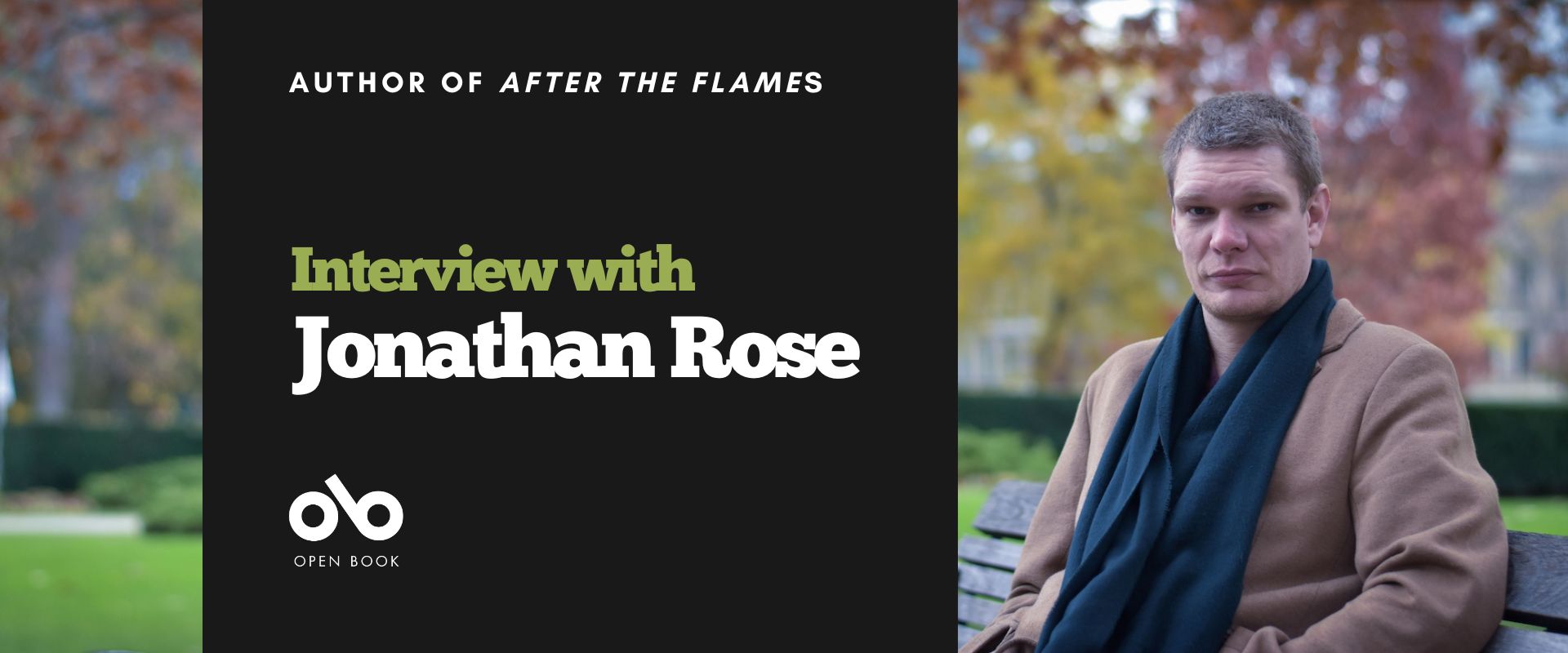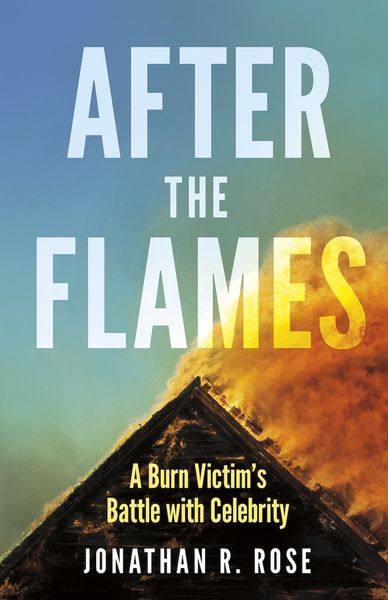Jonathan Rose Explores Survival, Heroism, and the Cost of Unintended Celebrity in After the Flames
Surviving a devastating fire, especially one that causes grevious bodily injury, is an immense challenge for any individual. Especially if they have done so with burns so severe that no one has ever experienced that level of physical damage. But, what if that is only the beginning, and the attention that follows adds further dramatic complication to that person's life?
In After the Flames: A Burn Victim's Battle With Celebrity (Dundurn Press), Jonathan R. Rose investigates the riveting and harrowing story of Joey Philion, who suffered third degree burns on 95 percent of his body after a housefire in Orillia, Ontario, on March 10th, 1988. He was not expected to survive the night, but he did. And his nightmarish path to recovery not only made him a global celebrity, but also revolutionized medical treatment for burn victims.
We're talking to Jonathan today as part of our True Story Nonfiction interview series, to learn more about this fascinating account of a young man thrust into the spotlight while challenged with an almost impossible uphill battle against the injuries suffered in that fateful fire. And further, how he and his family endured years of tremendous hardship and had their lives changed forever, all under the watch of an unforgiving public eye. It is a work of creative nonfiction that challenges the very idea of "heroism," and the truth of what happens beyond the headlines.
Open Book:
Tell us about your new book and how it came to be. What made you passionate about the subject matter you're exploring?
Jonathan R. Rose:
After The Flames is about Joey Philion and his family, which includes his mother, Linda, his younger brother, Danny, and his stepfather, Mike Hawkins, who is also my father. They went from being a regular family to international celebrities after Joey miraculously survived a housefire in 1988 that devoured their home and left Joey with 95% of his body completely burned. Most people don’t survive burns in the 35 to 45 percent range. Making his survival even more unbelievable was that he was only 14 years old when the fire happened. However, the book is about much more than Joey’s incredible survival, and the subsequent surgeries that helped revolutionize severe burn treatments around the world, it’s about how the celebrity that came with his survival ultimately led him and his family down a tragic path. It’s about how the media manipulated a lie Joey told to cover up his own accidental actions to boost a story that needed no such boosting, turning it into something completely different from what it was, and should have been.
My passion for the story rests in my direct involvement in it. I was forced to watch my father endure all the events detailed in the book, from a distance that felt further and further with every new and shocking development.
OB:
Is there a question that is central to your book? And if so, is it the same question you were thinking about when you started writing or did it change during the writing process?
JRR:
There are many questions central to After The Flames, but the one that stood out the most to me when I started writing the book, and still stands out to me now, is whether or not Joey Philion is a hero. It’s a question I have wrestled with for years. I believe he is a hero for surviving the burns he did, something nobody has ever done before, let alone doing it before their 15th birthday. However, the heroism bestowed on him by the media, and the public who obsessed over the story cultivated by the media, is where things get murky for me. Is a person a hero because everybody says they are? And what if the reasons behind the label have been manipulated, or corrupted? That is why my answer often changes like the seasons.
Your CanLit News
Subscribe to Open Book’s newsletter to get local book events, literary content, writing tips, and more in your inbox
When I started writing the book, I thought I would be able to answer the question, but I still couldn’t. Instead, I found myself exploring the question itself, and through extensive research I was able to consider and empathize with a variety of perspectives that helped me gain a proper understanding of what really happened to Joey and his family. After that, I realized the question of Joey’s heroism wasn’t nearly as important, or interesting, as the journey he and his family were forced to take following the fire that consumed their uninsured home and all but a small percentage of Joey’s adolescent body.
OB:
What was your research process like for this book? Did you encounter anything unexpected while you were researching?
JRR:
It wasn’t until 2019 when I knew I was ready to start writing After The Flames. In the spring of that year, I went to Vancouver Island and stayed in a small room in my uncle Kenny’s house in Campbell River. It was there I spent nearly eight months reading every archived newspaper article my father kept from the 1980s and 90s (there were hundreds of them), while also extensively interviewing my father (who also lived in Campbell River) about what really happened during that tumultuous period. Those conversations were a long time coming between him and I. Every single one of those interviews was emotionally draining for him, as they brought back many painful memories, but they also provided him with a long overdue catharsis because it was the first time he was being genuinely listened to, something the Canadian media refused to do at the height of the story’s popularity. He just wanted to tell the truth of what really happened, and that was all I was interested in hearing, and writing.
OB:
What do you love about writing nonfiction? What are some of the strengths of the genre, in your opinion?
JRR:
I love the research part of it, and it’s funny because I didn’t think I would. I initially thought it would be tedious and stressful, but I genuinely loved it. I was thrilled every time I dug up a newspaper article that showed me a perspective I didn’t even think about, or conducted an interview which allowed me to piece together events that occurred decades earlier. It was like performing literary archeology. It was exciting. I also quickly realized that the more research I did, the more I was able to flesh out the characters, while making the scenes far more realistic, making the story itself more compelling.
When it comes to the strengths of the genre, I believe they are rooted in the reality of the stories. It’s one thing to read a story that blows your mind because of how wonderfully written it is, but to know the story is based on real events makes it even more incredible. When done right, it adds an authenticity that fiction, no matter how good, can’t match, and that is why I always think it’s best to stick to what really happened when it comes to creating great nonfiction.
OB:
What does the term creative nonfiction mean to you?
JRR:
To me, Creative nonfiction is about taking a situation that really happened and retelling that reality in a way that focuses just as much on the narrative as the facts required to construct it. In creative nonfiction I believe there is an emphasis on making the narrative exciting and interesting, making it seem like a finely paced and structured written novel, while never diminishing, or sacrificing, the reality behind it. Truth and facts are tremendous assets to a story, but if the structure and narrative of that story is stale and boring, they all just go to waste.
Now, there is a constant temptation to lean too far toward the creative side, where the author can get deceived into believing they can invent or add something to improve upon an already incredible real situation, which rarely works. However, if the temptation can be resisted, and they can toe that line between creating an engrossing story while never losing sight of telling the real story, that is when you get incredible works like Truman Capote’s In Cold Blood, Rodolfo Walsh’s Operation Massacre, and James Agee’s Let us Now Praise Famous Men (especially the scenes where Mr. Agee describes the clothing and education of the families he was writing about), and that is what I strived for with After The Flames.
OB:
Do you remember the first moment you began to consider writing this book? Was there an inciting incident that kicked off the process for you?
JRR:
This story has been with me since I was six years old, back in 1988, when the fire that set everything in motion happened in Orillia, Ontario, but it wasn’t until I started taking writing seriously in my early twenties that I knew I would write about it. However, it took several more years until I developed enough confidence and experience to do so, which didn’t happen until 2019, so this book has been decades in the making.
OB:
What defines a great work of nonfiction, in your opinion? Tell us about one or two books you consider to be truly great books.
JRR:
For me, a great work of nonfiction is one that entertains and educates simultaneously. Some examples of what I mean are David Simon’s books: Homicide: A Year on the Killing Streets and The Corner: A Year in the Life of an Inner-City Neighborhood. I devoured those books, both of which are between 600 and 700 pages. They were so engaging they made me question how reality could be that fascinating and exciting? The answer was easy (while I’m sure the execution was anything but): it came down to Mr. Simon’s incredible ability to accumulate and present a vast collection of undeniably human details. Some of those details were thrilling and exploded off the page, while others were far more subtle, the kind that the average person would often overlook, and when combined they created an immersive narrative that had me hooked from the very first sentence to the final word. His work captured my attention and imagination in the same way my favourite writers, painters, comedians, film directors, and HipHop artists have been able to do.
___________________________________________________
Jonathan R. Rose is an avid traveller, spending more than half of his adult life abroad, with no intention of stopping. He is the author of the books Carrion, The Spirit of Laughter, and Wedlock. He currently resides in Mississauga, Ontario.





